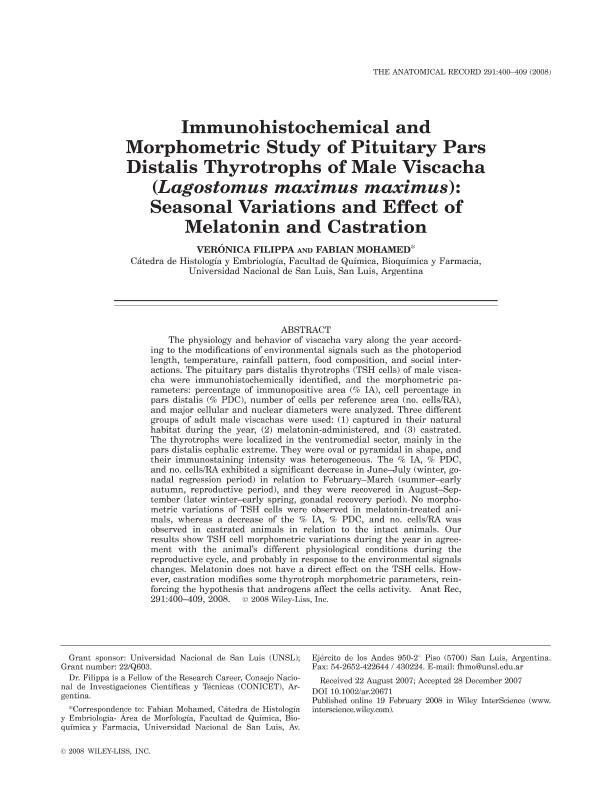Mostrar el registro sencillo del ítem
dc.contributor.author
Filippa, Veronica Palmira

dc.contributor.author
Mohamed, Fabian Heber

dc.date.available
2022-06-01T13:16:03Z
dc.date.issued
2008-04
dc.identifier.citation
Filippa, Veronica Palmira; Mohamed, Fabian Heber; Immunohistochemical and morphometric study of pituitary pars distalis thyrotrophs of male viscacha (Lagostomus maximus maximus): seasonal variations and effect of melatonin and castration; American Association for Anatomy; Anatomical Record; 291; 4; 4-2008; 400-409
dc.identifier.issn
0003-276X
dc.identifier.uri
http://hdl.handle.net/11336/158653
dc.description.abstract
The physiology and behavior of viscacha vary along the year according to the modifications of environmental signals such as the photoperiod length, temperature, rainfall pattern, food composition, and social interactions. The pituitary pars distalis thyrotrophs (TSH cells) of male viscacha were immunohistochemically identified, and the morphometric parameters: percentage of immunopositive area (% IA), cell percentage in pars distalis (% PDC), number of cells per reference area (no. cells/RA), and major cellular and nuclear diameters were analyzed. Three different groups of adult male viscachas were used: (1) captured in their natural habitat during the year, (2) melatonin-administered, and (3) castrated. The thyrotrophs were localized in the ventromedial sector, mainly in the pars distalis cephalic extreme. They were oval or pyramidal in shape, and their immunostaining intensity was heterogeneous. The % IA, % PDC, and no. cells/RA exhibited a significant decrease in June–July (winter, gonadal regression period) in relation to February–March (summer–early autumn, reproductive period), and they were recovered in August–September (later winter–early spring, gonadal recovery period). No morphometric variations of TSH cells were observed in melatonin-treated animals, whereas a decrease of the % IA, % PDC, and no. cells/RA was observed in castrated animals in relation to the intact animals. Our results show TSH cell morphometric variations during the year in agreement with the animal’s different physiological conditions during the reproductive cycle, and probably in response to the environmental signals changes. Melatonin does not have a direct effect on the TSH cells. However, castration modifies some thyrotroph morphometric parameters, reinforcing the hypothesis that androgens affect the cells activity.
dc.format
application/pdf
dc.language.iso
eng
dc.publisher
American Association for Anatomy
dc.rights
info:eu-repo/semantics/openAccess
dc.rights.uri
https://creativecommons.org/licenses/by-nc-sa/2.5/ar/
dc.subject
LAGOSTOMUS
dc.subject
PITUITARY
dc.subject
THYROTROPHS
dc.subject
IMMUNOHISTOCHEMISTRY
dc.subject.classification
Bioquímica y Biología Molecular

dc.subject.classification
Ciencias Biológicas

dc.subject.classification
CIENCIAS NATURALES Y EXACTAS

dc.title
Immunohistochemical and morphometric study of pituitary pars distalis thyrotrophs of male viscacha (Lagostomus maximus maximus): seasonal variations and effect of melatonin and castration
dc.type
info:eu-repo/semantics/article
dc.type
info:ar-repo/semantics/artículo
dc.type
info:eu-repo/semantics/publishedVersion
dc.date.updated
2022-05-20T15:05:33Z
dc.journal.volume
291
dc.journal.number
4
dc.journal.pagination
400-409
dc.journal.pais
Estados Unidos

dc.journal.ciudad
Washington D.C
dc.description.fil
Fil: Filippa, Veronica Palmira. Consejo Nacional de Investigaciones Científicas y Técnicas. Centro Científico Tecnológico Conicet - San Luis; Argentina. Universidad Nacional de San Luis. Facultad de Química, Bioquímica y Farmacia. Departamento de Bioquímica y Ciencias Biológicas; Argentina
dc.description.fil
Fil: Mohamed, Fabian Heber. Universidad Nacional de San Luis. Facultad de Química, Bioquímica y Farmacia. Departamento de Bioquímica y Ciencias Biológicas; Argentina
dc.journal.title
Anatomical Record

dc.relation.alternativeid
info:eu-repo/semantics/altIdentifier/url/https://anatomypubs.onlinelibrary.wiley.com/doi/full/10.1002/ar.20671
dc.relation.alternativeid
info:eu-repo/semantics/altIdentifier/doi/https://doi.org/10.1002/ar.20671
Archivos asociados
